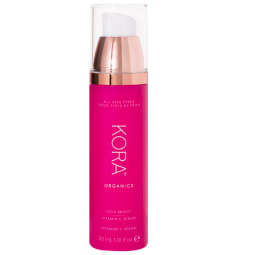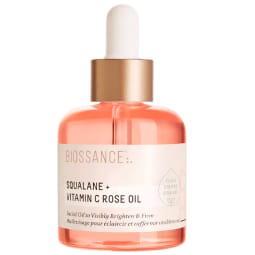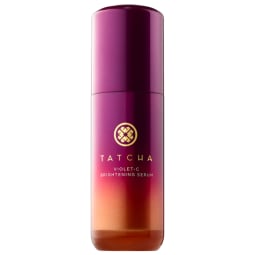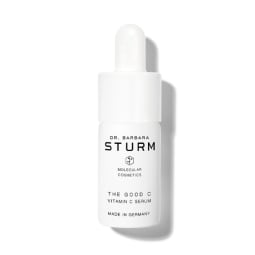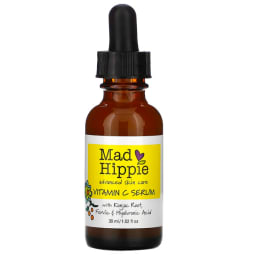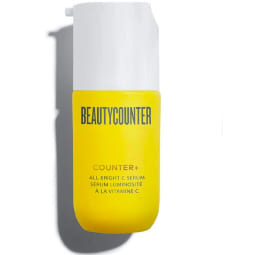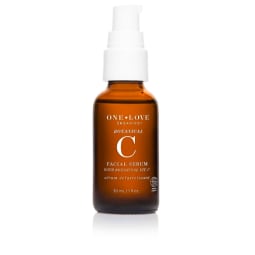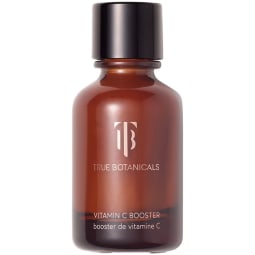Advertisement
The 12 Best Vitamin C Serums + Benefits & Application Tips


Vitamin C is a skin care staple for many skin care pros—including myself, as a beauty director with a decade of experience in the beauty market. I use vitamin C serums almost every day (I'll switch it up and add another antioxidant serum or a hydrating serum depending on how my skin is feeling). And I've been using the collagen-boosting antioxidant for about eight years now, so I've tried a lot of options out there from natural and clean to traditional.
So I feel pretty comfortable recommending options for any skin type and price point. Here, the best options I've ever tried.
Best vitamin C serums
Vitamin C benefits.
Vitamin C skin care products check all the boxes: turn back the clock on wrinkles, fight free radicals, even out skin tone, and give your complexion a serious glow.
"Vitamin C is one of the few active ingredients that can benefit all skin types," says Elizabeth Tanzi, M.D., board-certified dermatologist in the Washington, D.C., metro area and associate professor of dermatology at George Washington University Medical Center.
Here are a few things you can expect from using the skin care ingredient:
- Collagen production. Vitamin C is a vital part of the collagen synthesis process, helping collagen cross-link and support skin firmness. It doesn't just stimulate collagen production; it stabilizes the collagen1 you have, leading to overall wrinkle reduction.
- Antioxidant support. Vitamin C is an antioxidant and thus can help protect skin against free radicals. Additionally, research has found that when skin is excessively exposed to external aggressors (unprotected UV exposure and pollution, for example), its natural reserves of vitamin C become depleted2. It makes sense, then, that replenishing vitamin C levels in the skin can lead to a seemingly endless list of protective and restorative benefits.
- Brightening and evening tone. Vitamin C can also help with your overall health and skin tone, helping with dark spots, inflammation, and appearance. Research shows it has beneficial outcomes for things like fading hyperpigmentation1, brightening3, and even taming rosacea (thanks to its anti-inflammatory1 properties).
How we picked
Clean formulas
The products that appear on this list are formulas free of commonly avoided ingredients like parabens and phthalates.
Effective vitamin C
There are many kinds of vitamin Cs that can be used in serums. Some are more potent (like l-ascorbic), but come with drawbacks like increased skin sensitivity, while others are more gentle. We included a variety to aid any skin type.
Supporting actives
These formulas use additional skin-loving ingredients that bolster the overall effectiveness—and your glow.
Tried & tested
These serums have all been tested by the mbg staffers, our trusted pros, and real users.
Best vitamin C serums
Best overall: Marie Veronique C+E+Ferulic Acid Serum
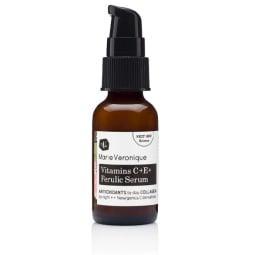
Pros
- Beauty editor favorite
- 4 kinds of vitamin C
Cons
- Strong smell (that comes from the natural ingredients — it has no added fragrance)
Ingredient considerations:
VeganHyaluronic acidVitamin EFerulic acidPlant extractsCoQ10Size:
1 FL OZ / 30 mLVitamin C type(s):
L-ascorbic acidL-ascorbyl palmitateTetrahexyldecyl ascorbateMagnesium ascorbyl phosphateThis is my personal favorite vitamin C serum—the one I keep going back to and have recommended countless times. It contains four different kinds of vitamin C (l-ascorbic acid, l-ascorbyl palmitate, tetrahexyldecyl ascorbate, magnesium ascorbyl phosphate) that help provide a wide range of benefits. Then it's combined with vitamin E and ferulic acid, which help bolster the antioxidant's collagen-producing abilities. It's a genius formula that seriously delivers.
What users say:
Not only is this my personal favorite, but it’s a bestseller at Credo and has been highlighted by the likes of New York magazine, Harper’s Bazaar, and more. Users agree that if you can tolerate the smell—it’s well worth it: “It’s my favorite Vitamin C serum. I find it really does improve my complexion and make it brighter.”
Pros
- 68.8% of the total ingredients are organic with COSMOS ORGANIC and ECOCERT Greenlife certification
- Not only does this have a stabilized form of vitamin C, but it includes 2 natural sources
Cons
- Some skin types are sensitive to EOs
Ingredient considerations:
VeganCruelty-freeHyaluronic acidPlant extractsEssential oilsAloe veraSize:
1 FL OZ / 30 mLVitamin C type(s):
Ascorbyl glucosideKakadu plum fruit extractAcerola cherry fermentThis has a bouquet of antioxidants—including 12% ascorbyl glucoside—as well as kakadu plum, acerola cherry, orange peel, lemon peel, and noni fruit. Translation? This is like a morning superfruit smoothie for your skin. But it doesn't stop there. It has the humectant sodium hyaluronate to help skin hold on to water and olive leaf extract to soothe irritation.
What users say:
Yet another vitamin C serum I keep in regular rotation, I’ve made my way through at least two of these bottles. It’s a solid formula that folks who prioritize organic ingredients will love—one user notes they're a repeat user too: “Third time I bought this vitamin c serum—certainly worth a repeat.”
Advertisement
Best brightening: Ole Henriksen Banana Bright Vitamin C Serum
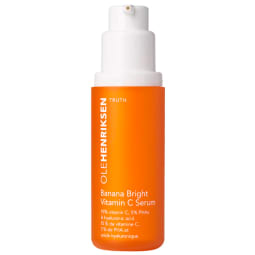
Pros
- Gently exfoliating
- Has light-reflecting mica for an instant skin brightening boost
Cons
- Some experience pilling or tacky texture
Ingredient considerations:
VeganCruelty-freeHyaluronic acidVitamin EPlant extractsEssential oilsPHAsSize:
1 FL OZ / 30 mLVitamin C type(s):
3-0-Ethyl ascorbic acidIf your main goal is brightening dullness, reach for this powerful option that comes with a potent dose of 15% stable Ethyl ascorbic acid as well as 5% polyhydroxy acids. PHAs (sometimes called gluconolactone) are an innovative alternative to AHAs that helps even skin tone via chemical exfoliation and are super gentle. There's also hyaluronic acid to help hydrate and plump skin for a dewy affect.
What users say:
The illuminating serum gives an instant vibrant lift upon application, but users love it for the long-term results too: “Helps even out and brighten skin. I've gotten so many comments from people telling me I'm glowing since I started using it.”
Pros
- Great for dry skin
Cons
- Doesn’t pair well with some makeup, so you should use it at night
Ingredient considerations:
VeganCruelty-freePlant extractsEssential oilsSqualaneSize:
1 FL OZ / 30 mLVitamin C type(s):
Tetrahexyldecyl ascorbateOK this isn't a serum, however, if you're looking for an oil version vitamin C this is your best bet. It uses lipid-soluble vitamin C called Tetrahexyldecyl ascorbate, and it's blended with the brand's signature squalane. An application tip: This should be used to top your skin care routine as it's thicker, and other items won't be able to penetrate the skin as easily. Consider this your option if you have extra-dry skin and need to trap in moisturizer—however, it will likely be too thick for those with easily clogged skin.
What users say:
This award-winning oil has racked in over 2K reviews on their site, including 1.7K 5-star comments like this one: “I wake up to see my skin looking better than ever before. Bought it as a present to myself on my 62nd birthday. I wish I had it 20 years ago.”
Advertisement
Pros
- Strong actives at their highest dosages
Cons
- Pricey
- Some will find this formula hard to tolerate
Ingredient considerations:
VeganCruelty-freeHyaluronic acidPlant extractsAHAsSize:
1 FL OZ / 30 mLVitamin C type(s):
Bis-glyceryl ascorbateA more potent option, this combines 20% Bis-Glyceryl Ascorbate and a 10% AHA blend. This will provide serious brightening, exfoliating, and smoothing properties. Consider this your ideal formula if you have breakouts, acne marks, texture concerns, or wrinkles. However, if you have sensitive skin—this can be irritating, so I recommend avoiding it.
What users say:
As someone with sensitive skin, I can’t use this regularly—however, I count it as a staple overnight treatment when I need to wake up glowing. As for folks with a bit more durable skin than I, one user says: “Thanks to Tatcha, I cried happy tears this morning because I woke up to 100% clear skin for the first time since I was 13 years old (I am 29 now). I have used this product morning and night for the past 1.5 months.”
Pros
- Zinc can help deliver vitamin C into the skin for a more effective treatment
Cons
- Very expensive
- Like many vitamin C serums, it has a distinct smell
Ingredient considerations:
VeganCruelty-freeHyaluronic acidAloe veraSize:
1 FL OZ / 30 mLVitamin C type(s):
Tetrahexyldecyl ascorbateAscorbic acidFor those with sensitive skin, ingredient lists can be a landmine of irritation. There are a few ones that standout as common triggers, such as retinol and AHAs. However, did you know that many types of vitamin C can be hard to tolerate, too? This option uses a lower concentration of 5% vitamin C, alongside super calming and hydrating ingredients like hyaluronic acid, aloe vera, and zinc.
What users say:
Lots of folks struggle with finding a vitamin C product that doesn’t make their skin go haywire. But this hydrating blend has proven to be the right fit for many folks: “This is one of the first Vitamin C’s I can use that doesn’t leave me red and irritated. Lightly hydrating also.”
Advertisement
Pros
- Vitamin C serums are often very expensive, and this one is more budget-friendly
Cons
- Some report breakouts, so avoid if you are acne prone
Ingredient considerations:
VeganCruelty-freeHyaluronic acidVitamin EFerulic acidPlant extractsEssential oilsAloe veraSize:
1 FL OZ / 30 mLVitamin C type(s):
Sodium ascorbyl phosphateThis award-winning serum has rave reviews across the internet, making it a natural cult favorite. We know why: This smart formulation has a solid mix of actives to bring your skin serious all-over benefits. There's the vitamin C (as sodium ascorbyl phosphate), hydrating glycerin, stabilizing vitamin E, soothing aloe, and plumping hyaluronic acid.
What users say:
The hard truth is that vitamin C serums are an expensive category—and one in which you get what you pay for. This is because vitamin C is a hard active to formulate with, and requires high-quality ingredients alongside it. However, one user notes that this is a standout amongst other more expensive formulas: “I’m sure I’ve spent a small fortune on my face over the last 15-20 years and between all the random OTC products, dermatologist visits and prescriptions, this is one I am very pleased with so far!”
Best for acne-prone skin: Ursa Major Brighten Up Vitamin C Serum
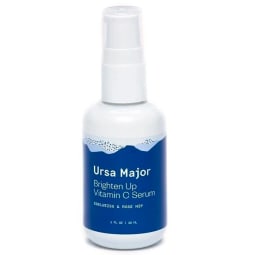
Pros
- An acne treatment that’s non-drying
- Contains vitamin C as well as botanicals naturally high in the antioxidant
Cons
- Not as potent of a dose of vitamin C
Ingredient considerations:
VeganCruelty-freePlant extractsEssential oilsAloe veraBHAsSize:
1 FL OZ / 30 mLVitamin C type(s):
Ascorbic acid polypeptideWe love the plant actives and botanicals in this blend. Of course there's the vitamin C, but there's also rosehip seed oil (high in vitamin C in its own right), aspen bark (a natural source of salicylic acid to help deal with oil production and acne), aloe (for soothing and hydrating; it can also fade dark spots), and rose (for balancing tone and texture).
What users say:
A lightweight formula that won’t clog pores and will help treat breakouts with botanical extracts. What more could you ask for? Users agree: “It makes my skin clear and bright. Keeps my completion smooth too.” Another says: “For about 25 years I felt like I needed to hide my skin behind tints or concealer…now I let it glow and let it go!”
Advertisement
Pros
- Quick-absorbing
Cons
- Bright yellow serum (from turmeric) that can lightly stain fabrics
- Pricey
Ingredient considerations:
VeganCruelty-freeEssential oilsTurmericSize:
1 FL OZ / 30 mLVitamin C type(s):
Tetrahexyldecyl ascorbateBis-glyceryl ascorbateThe base is a 10% blend of two forms of vitamin C that help deal with dark spots and dullness. Additionally, the serum gets extra antioxidants from turmeric and camu camu extracts. We particularly love turmeric, as it's known as a famous anti-inflammatory and can tame angry skin.
What users say:
With almost 9K reviews and a near perfect score of 4.9, this serum has inspired a loyal fan base. One writes: “The application is like silk and absorbs quickly into my skin. I am 78 and I get compliments on my skin all the time. People always think I am much younger.”
Pros
- Organic ingredients
Cons
- Higher oil concentration, if you’re looking for a more lightweight formula
Ingredient considerations:
VeganCruelty-freeVitamin EPlant extractsSize:
1 FL OZ / 30 mLVitamin C type(s):
Ascorbyl palmitateBotanical vitamin C complexThis ultra-moisturizing facial serum feeds skin antioxidants from vitamin C, E, and green tea, while conditioning skin with jojoba oil, shea butter, and sea buckthorn oils. Put that all together and you've got seriously hydrated, glowing, happy skin.
What users say:
What makes this so appealing for people with dry skin? The texture, as one user described it as “halfway between a serum and an oil,” explaining that “there's usually unabsorbed product on my skin, but I don't mind the extra hydration” and “spreading this serum across my skin feels so luxurious.”
Advertisement
Pros
- Highly stable thanks to the powder delivery method
- Only 3 ingredients: Vitamin C, tapioca starch, and ferulic acid
Cons
- Have to mix with another product
Ingredient considerations:
VeganCruelty-freeFerulic acidSize:
0.49 OZ / 14 gVitamin C type(s):
Ascorbic acidThis starts as a powder blend of vitamin C and ferulic acid—just sprinkle a bit into your serum of choice and you'll bring loads of antioxidant benefits into the base formula. Basically you can make any serum a powerhouse vitamin C option with this powder!
What users say:
This powder is an option I always have on hand—who doesn’t want semi-DIY vitamin C serum they can create in a pinch? And because it’s powder, it’s travel-friendly! Other users love that they can mix-and-match as well: “I like this vitamin c because it feels like I’m a chemist and it’s good to mix with my serums.”
Best for morning: Youth To The People 15% Vitamin C Clean Caffeine Energy Serum
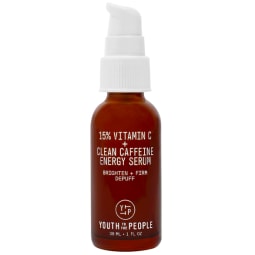
Pros
- Tap it around the eyes to address dark circles
Cons
- Some people are sensitive to caffeine in products
Ingredient considerations:
VeganCruelty-freeSqualaneSize:
1 FL OZ / 30 mLVitamin C type(s):
Tetrahexyldecyl ascorbateMagnesium ascorbyl phosphate3-0-Ethyl ascorbic acidA perfect option for your morning vitamin C serum, this combines the vitamin with caffeine (caffeine is a great option for skin as it encourages circulation to the skin) from superleafs yerba mate and guayusa to immediately brighten, visibly reduce morning puffiness, and hydrate.
What users say:
Just like people cherish their morning cup of coffee, users cherish their morning dose of this serum: “I’ve used this product for a couple years now and have yet to find anything that compares. I love the glow that it gives my skin in the mornings.”
Application tips.
Here, how you should use your new vitamin C serum.
- Vitamin C is notoriously unstable, so be mindful of how you store it. See products lose potency4 as soon as they're exposed to air, heat, light, and water, so make sure to keep your packaging closed tight and don't leave it in the sunlight.
- Always apply it on clean skin, right after washing. (This way, it can penetrate the skin cells.) You'll want to let it dry, as adding something on right after could potentially deactivate the vitamin C. Once dry, follow it with your daily face moisturizer and the rest of your skin care routine.
- Don't use it with retinoids—as these ingredients don't really play well with each other. If you want to use a retinol, we recommend using it at night and vitamin C in the morning. The caveat to this: If it's formulated in the same product, it's probably using a more stable derivative of vitamin C and fine to use.
- Speaking of derivatives, pay attention to the one in your formula. It can affect the stability and efficacy of the product. Vitamin C comes in many derivatives, including L-ascorbic acid, magnesium ascorbyl phosphate, tetrahexyldecyl ascorbate, ascorbyl palmitate, sodium ascorbyl phosphate, and ascorbyl tetraisopalmitate. (Unlike L-ascorbic acid, which is hydrophilic and unstable, both ascorbyl-6-palmitate and magnesium ascorbyl phosphate are stable at neutral pH5.) Look for our other formulation tips here.
- Find an option with vitamin E or other antioxidants, which can boost its potency. "Certain antioxidants are synergistic," says Julia T. Hunter, M.D., founder of Wholistic Dermatology in Beverly Hills. "They strengthen one another, regenerate one another, and last longer in the body, so they're more available in the skin." One study found that vitamin E and ferulic acid increase vitamin C1's effectiveness eightfold.
FAQ
How do I choose a good vitamin C serum?
Vitamin C serums come in many varieties, so it’s important to find one that is formulated to suit your skin types and goals. For the most potent end of the spectrum, look for 20% L-ascorbic acid. However, not all skin types can tolerate that, so you may want to look for lower concentrations or more gentle versions of vitamin C. (Other great vitamin C options include Tetrahexyldecyl ascorbate, Magnesium ascorbyl phosphate, and 3-0-Ethyl ascorbic acid.) In addition, you’ll want to make sure it’s formulated with skin-boosting ingredients, such as ferulic acid, vitamin E, other antioxidants, and humectants.
Do dermatologists recommend vitamin C serum?
Not only do dermatologists recommend vitamin C serum, most encourage it! Alongside retinol, vitamin C is the most commonly recommended ingredient for skin care due to its antioxidant properties, role in collagen production, and skin brightening abilities.
Is it OK to use vitamin C serum everyday?
For the most part, vitamin C is OK to use everyday—in fact, most people can use it twice daily. However, some folks find the ingredient hard to tolerate with daily use (it can be irritating to some skin types), so may consider using it every other day or as tolerated.
mbg’s review process
At mbg, high standards are earned—and there are no shortcuts. Our beauty editors stay up to date on the latest ingredient research and innovation. It's a dynamic, continuously evolving space, and it's important we look into the science so we can make informed choices about which formulas earn our stamp of approval (figuratively speaking).
Our high standards also come from testing products—many, many products. Our editors and writers rigorously test and research the products featured in our roundups to offer you the best, most informed recommendations. When we write reviews, you can trust we spend quality time with the formulas: We don't simply rave about products we've slathered on the back of our hand. We endorse products we've tried and loved.
Learn more about our testing process and clean beauty standards here.
The takeaway.
If you're looking to add a vitamin C serum to your routine, I highly recommend you do. It can help your skin's collagen synthesis process, fight off free radicals, and improve the overall appearance. Believe me, I've tried a lot. And these are my favorites. Want to optimize your vitamin C levels internally? Look for a vitamin C supplement.
